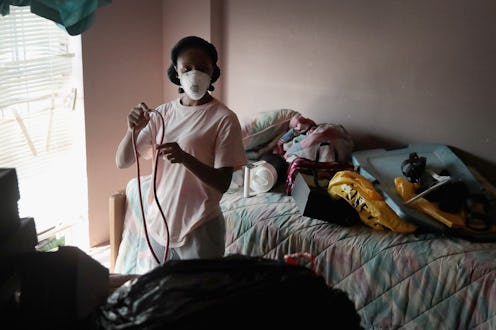Life
7 Organizations Helping Disabled People Recover From Harvey That You Can Support Right Now

By now, most have seen the heartbreaking viral photo of disabled nursing home residents sitting in waist-deep water before they were rescued from Hurricane Harvey. The photo was yet another reminder that natural disasters are devastating for marginalized and impoverished communities. Luckily with the advent of internet activism and the rise of social justice work on Twitter, risk reduction techniques and resources for disabled folks after natural disasters are more widely accessible now than ever before.
For disabled and chronically ill people, natural disasters like Hurricane Harvey can carry especially severe and long term consequences. They are at higher risk to be neglected, abandoned, and restricted from receiving necessities like food, water, shelter, and healthcare. This isn't a recent phenomenon; during Hurricane Katrina, the disabled community was completely disregarded and dehumanized. Not to mention the fact that natural disasters can lead to an influx of people with new physical and mental disabilities, including Post Traumatic Stress Disorder (PTSD).
Since Hurricane Harvey, many activists have noted that the Red Cross has a problematic history of using their donations, so if you're uncomfortable with that, opt to send your money to local groups or trustworthy, national organizations that directly benefit the disabled community. Below are some local and national resources you can donate to and share to help disabled and chronically ill people who are adversely affected by natural disasters.
Portlight Inclusive Disaster Strategies
Portlight Inclusive Disaster Strategies is a nonprofit dedicated to providing accessible post-disaster relief and resources to disabled communities. Currently, they are running a Hurricane Harvey Disability Hotline to assist people with disabilities and their families in finding safe accommodations.
The Federal Emergency Management Agency (aka FEMA)
FEMA is providing an friendly interface for folks who are deaf and in need of assistance during natural disasters. Additionally, the Harvey Interpreter Hotline was created to help those in Texas shelters in need of an interpreter.
American Disabilities Act National Network
The American Disabilities Act National Network has a lot of valuable information, and on their site right now you can find an emergency resource list for Hurricane Harvey.
The Substance Abuse and Mental Health Services Administration (SAMHSA)
SAMHSA offers a free counseling through their Disaster Distress Hotline for people experiencing trauma due to natural disasters. There is also a specific Disaster Survivors with Disabilities Hotline.
Healthcare Ready's Rx Open Program
Rx Open is a tool that provides a routinely updated list and maps of open pharmacies in areas affected by natural disasters, so disabled communities know where to access important medication.
United Way 2-1-1
United Way 2-1-1 provides disaster relief aid across the United States and Canada by partnering with local organizations in devastated areas. Notably, they can provide resources for homebound disabled people who are in need of safety and relocation.
Little Lobbyists
Little Lobbyists is an advocacy group that fights for accessible healthcare, especially for children with special medical needs. They are currently participating in a medical supply and fund campaign to assist children with disabilities affected by Hurricane Harvey.
The disabled community deserves the same level of accessibility, assistance, and support that able-bodied people receive when there is a natural disaster. Hopefully. as our awareness around disability rights grows, our post-disaster resources will continue to become more abundant and readily available.